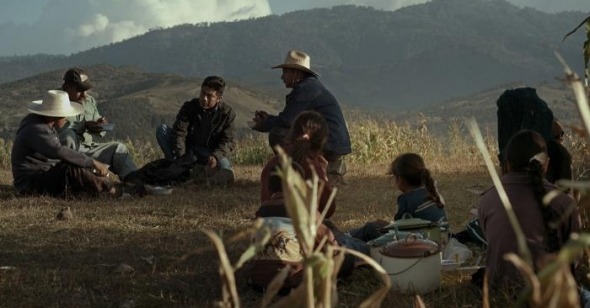Danger Zone
by Benjamin Mercer
Here and There
Dir. Antonio Méndez Esparza, Mexico, Torch Films
Watching Here and There, the Mexico-set debut feature by the Spanish-born Antonio Méndez Esparza, one might anticipate a big-event sucker punch, as frequently occurs in films showcasing festival-circuit realism with a strong sense of place and a societal-problem subject. The movie, which includes nonprofessionals among its cast, deals rather frankly with immigration—its protagonist has just returned to a poor corner of the state of Guerrero after a spell working north of the border. And there’s plenty of cause for worry. Esparza floats so many opportunities for shouting-match conflicts and domestic crises for his central family that the viewer might grow to fear what’s coming. Patriarch Pedro (Pedro de los Santos) comes home to a family somewhat unsettled by his presence, with his wife, Teresa (Teresa Ramírez Aguirre), wary of his touch, and his eldest daughter, Lorena (Lorena Guadalupe Pantaleón Vázquez), showing a more volatile rebellious streak. Later in the many-months narrative, pregnant Teresa winds up in the city hospital after a perilously premature delivery, and, for a while, both mother and daughter are reported to be in critical condition; Pedro must then go far afield to purchase prescription drugs the hospital is unable to provide. After that episode, Pedro offers to vouch for a young man seeking passage to the United States, an expensive and involved process in which it’s easy to imagine something going wrong and the finger ultimately being pointed back in his direction.
But none of these incidents metastasizes into a full-blown conflict—at least in the way one might expect. The family appears to grow together, not apart, eventually welcoming a (healthy) fifth member, while no one beyond their four walls seems to betray anyone else’s trust. Some of Pedro’s most difficult fellow-villager conversations are with members of his band (christened the Copa Kings) as they break the news that practice might interfere with their work. There’s barely a hint of argument here, but in such scenes, Esparza does fashion in the figure of Pedro the musician a nice encapsulation of the whole character’s predicament. We are given to assume gigs are few and far between (in only one scene does he field an offer to play, for a sum that he appears to find minuscule, while he’s seen toiling in the cornfields several times); at home, though, things are steadier, with a tough but nonetheless captive audience. In what is perhaps the most moving scene, he plays guitar and sings for his wife and kids as they jokingly throw money into a small basket at his feet; Lorena and her sister, Heidi (Heidi Laura Solano), can’t help but crack up at the situation and the persona he puts on to perform, but he manages to silence the crowd with a resonant corrido.
A crisis does develop—slowly, though, and by accumulation, rather than as an aftershock of any single event. With growing financial obligations and work opportunities evaporating, Pedro finds himself in a hole, kept up at night by worries about how to repay loans to his neighbors. For a while, we hold out hope that these problems might go away with a single turn of good fortune, as so many of the film’s other potential worries have. But they persist. Here, Esparza establishes the sad fact that this family’s solvency can only become more uncertain while they live under the same roof. Though the filmmaker never shows us the “there” of the title, its presence constantly looms—even over the relatively remote village where the majority of the film takes place. Many lines of dialogue touch on the brokenness or displacement of the families around town: One teenage dropout character finds himself living with his aunt after both his parents emigrated to north; at one point, Heidi tells Lorena about a classmate of hers who must move because her father has taken up with another woman in the U.S. and stopped sending money to his wife back in Mexico.
Here and There won the Critics’ Week Grand Prize at Cannes in May, and it’s easy to see why this might be branded a critics’ film, since in addition to moving rather deliberately, it takes so many little detours from the expected—something those who scrutinize narrative features for a living (or long-haul hobby) will frequently come to value over more conventional dramatic satisfactions. There’s nothing affected or reactionary here, though—the debut feature by Esparza (the writer-director is a graduate of the film program at Columbia University) displays an unhurried human generosity that’s too often lacking in global life-on-the-margins cinema, with its often suffocating atmosphere of determinism. What’s heartbreaking in it, and the way it sinks in, feels novel: We worry not so much about this family’s survival as we do that what we’ve just witnessed—Pedro’s time at home—might by necessity be a break from the routine.
